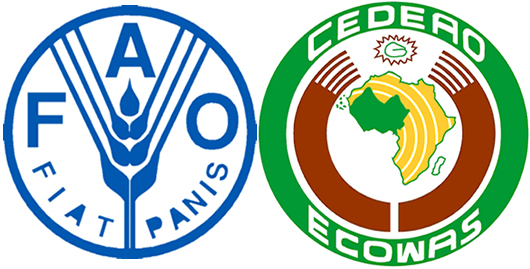 The Economic Community of West African States (ECOWAS) in collaboration with the Food and Agricultural Organization (FAO) and other partners, has officially launched the West Africa Zero Hunger Initiative at an inception workshop held in Accra on the 24th February, 2014.
The Economic Community of West African States (ECOWAS) in collaboration with the Food and Agricultural Organization (FAO) and other partners, has officially launched the West Africa Zero Hunger Initiative at an inception workshop held in Accra on the 24th February, 2014.
The three-year initiative would seek to accelerate efforts of member states within the sub-region in eradicating hunger and poverty, reducing malnutrition; promoting sustainable developmental growth and also help in adopting a new approach to the governance of agricultural, food and nutrition issues in West Africa.
In his opening address, the Commissioner of Agriculture, Environment and Water Resources of ECOWAS, Dr. Lapodini Marc Atouga, who represented the President of ECOWAS Commission, said that the food crisis in the region has become cyclical in nature; attributing this to structural weaknesses in agricultural production systems, low investments and other external factors such as climate and environmental degradation.
Dr. Atouga therefore called for a paradigm shift from short term agricultural solutions to a more comprehensive and holistic solution to the problems of food and nutrition insecurity in the West African region.
According to him, the “Zero Hunger Initiative” is part of ECOWAS’ efforts to accelerate agricultural development in the region.
“This project will help in addressing the structural challenges of West African agriculture and also put in place an efficient, productive and sustainable agriculture that is able to meet the growing food needs under economic and commercial conditions that address vulnerability” he explained.
The Minister of Food and Agriculture , Hon. Clement Kofi Homado, who chaired the event, reiterated governments commitment to ensuring food security for the people of Ghana through agricultural based interventions adding that the government is increasingly prioritizing individuals’ right to food.
“The government of Ghana will seek to achieve consistent and significant growth in the agricultural sector, make our agriculture policies more nutrition-sensitive and make efforts to increase current national budget above the 10% required by the Maputo declaration” he added.
Hon. Homado also advocated for small holder farmers, who are usually the main actors of the agricultural sector in the sub-region, to form the centrality of the Zero Hunger project and the fight for food security in general.
The German Ambassador to Ghana, H.E John Rudiger, also present at the event, said that West Africa is undergoing important structural transformations such as growing populations, rising urbanization etc. and such trends have major implications on regional food systems.
“Germany is therefore proud to be funding this joint initiative of FAO and the ECOWAS Commission by providing a financial support of $2.4 million to eradicate hunger and improve nutritional well-being“ he added.
The Country Representative of FAO, Dr. Thiambiano Lamourdia, also called on all development partners and funding agencies to significantly increase their contributions towards the fight against hunger in West Africa by fully aligning their support to, and subscribing to the hunger free agenda.
“There is ample room for everyone to be part of making hunger history in West Africa by 2025,” he added.
Participants at the workshop are expected to forge a common understanding among key stakeholders on the nature of the Zero Hunger Initiative and deliberate on a country-focused and results-oriented set of actions that reinforces and strengthens existing strategies and programmes to end food insecurity and malnutrition in the West African region.
By Prince Asare, Diplomatic Call











